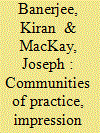|
|
|
Sort Order |
|
|
|
Items / Page
|
|
|
|
|
|
|
| Srl | Item |
| 1 |
ID:
113253


|
|
|
|
|
| Publication |
2010.
|
| Summary/Abstract |
As one of the traditional peacekeepers with vast field experiences, India should rise to new levels of peacekeeping-not just participating by way of deploying Indian troops as part of a UN force to keep peace in various parts of the world, but also by strategically utilizing its field experiences to shape new thinking about peacekeeping. Is there a case for India to take on such a role? What explains India's proactive commitment to UN peacekeeping? What is India's reputation in UN peacekeeping? Are there challenges to the leadership potential of India in UN peacekeeping? This article aims to answer some of these questions. To this end, it is argued that although India, based on its peacekeeping strengths, experiences and reputation, has more than a credible case to 'lead' new thinking about peacekeeping, complex challenges may make it difficult for India to be recognized to take such a lead.
|
|
|
|
|
|
|
|
|
|
|
|
|
|
|
|
| 2 |
ID:
175553


|
|
|
|
|
| Summary/Abstract |
Military attachés and wartime observers have received surprisingly little attention in international relations. Why do states exchange attachés, permitting uniformed foreigners to gather intelligence on their territory and during their wars? To explain, we adopt a broadly practice-theoretic approach, focusing on the individuals who developed the role by living it, showing how they both innovated a distinct military practice and established institutional legitimacy for attachés. We address an early historical case in which the practice proliferated: the Russo-Japanese War, throughout which observers represented multiple European states, on both sides of the conflict. Sometimes termed the first modern war, the conflict saw Japan's entry into the Eurocentric great power system. In this context, embedded attachés had a dual effect. On the one hand, a professional attaché community established itself: we show how local innovation by embedded officers, in the context of this structurally destabilising event, permitted the creation of a new institutional role that might otherwise have been impossible. On the other, the Japanese made use of the attachés as witnesses for Western governments, observing their performance of great power-hood, as they defeated Russia. The argument has implications for understanding both the military attaché system and communities of practice as such.
|
|
|
|
|
|
|
|
|
|
|
|
|
|
|
|
|
|
|
|
|